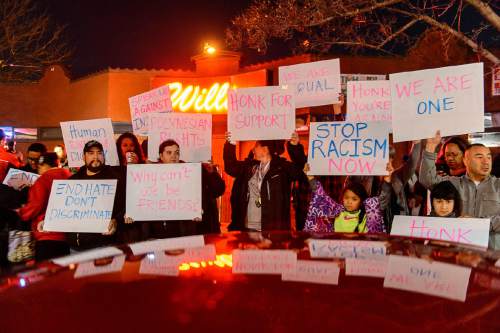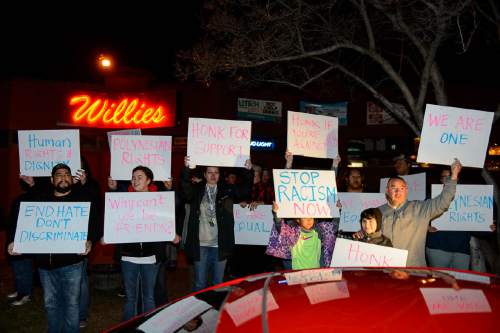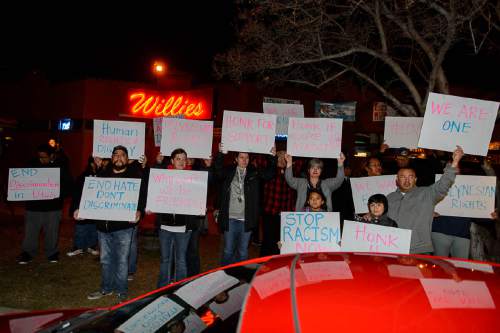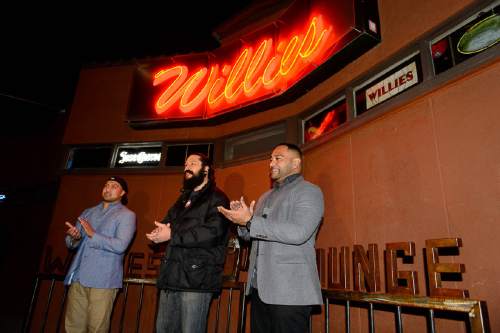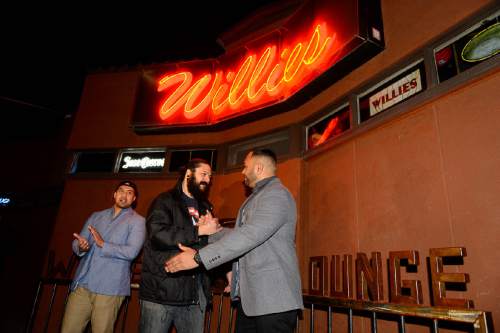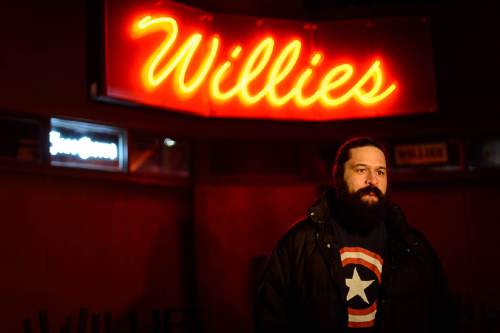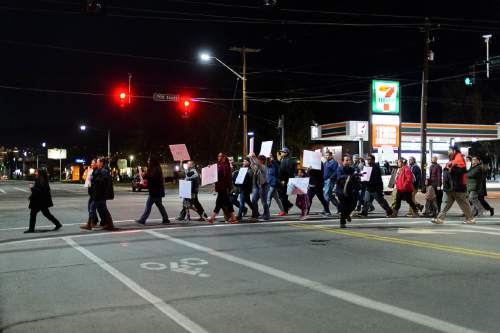This is an archived article that was published on sltrib.com in 2016, and information in the article may be outdated. It is provided only for personal research purposes and may not be reprinted.
Initially, Mike Tuiasoa said, he was writing tongue-in-cheek when he asked concerned friends to meet in front of Willie's Lounge and perform an ancestral war dance, answering the bar's ejection of two Polynesian men on the basis of their ethnicity earlier this week.
But as responses from friends and family flooded Tuiasoa's Facebook page, he said, "I kind of started thinking, 'Well, if you guys want to do something, then let's do something.'"
But as responses from friends and family flooded Tuiasoa's Facebook page, he said, "I kind of started thinking, 'Well, if you guys want to do something, then let's do something.'"
On Saturday night, dozens of people gathered outside his Watchtower Cafe coffeehouse in Salt Lake City. From there, the group walked around the block to Willie's, where cousins Stephen Wily and Frank Maea were denied service and instructed to leave Tuesday night.
Wily and Maea stood on either side of Tuiasoa outside the bar and thanked the crowd of more than 50 people who turned out for the gathering where members of the community spoke out for greater tolerance. The event organizers decided not to do the ancestral war dance.
Lavinia Taumoepeau-Latu, the immediate past chair of OCA-Utah, an advocacy group for Asian Pacific Americans, said that the false stereotypes that "led to this intolerance are endemic" of discrimination against native Hawaiian and Pacific Islander communities.
"But it's not limited to this one establishment," she said. "It is a daily experience that we encounter at businesses, government and educational institutions, and among the general population, that can lead to tragic outcomes when they shape police perceptions of our community members."
Matapuna Levenson, of the Utah Pacific Islander Civic Engagement Coalition, added that "we are here today not to villainize, not to burn bridges, not to create more contention amongst our community. We are here to unite."
She encouraged getting to know people better, as "it would be difficult to discriminate if you know someone personally."
Maea recorded a short cellphone video at the bar that he posted to Facebook. As of Saturday morning, it had been shared more than 5,000 times.
Willie's Lounge owner Geremy Cloyd explained Wednesday that he told his bartenders they could turn away Polynesian patrons because some have caused trouble in the past.
Tribune news-gathering partner KUTV streamed Cloyd's emotional apology Friday, in which Cloyd said Willie's had "screwed up."
"We're doing everything we can to make it right," he told KUTV, adding that he has received threats.
An attorney for Maea told The Tribune on Friday that he planned to file a federal lawsuit Monday.
Utah has the nation's largest per capita share of residents of Pacific Island descent, at around 37,000 total, according to U.S. Census data.
Tuiasoa said he moved to Utah from Hawaii at age 14 and has encountered discrimination ever since.
While he was an Orem high-schooler, he was once part of a large group that included Tongans and Samoans, celebrating a birthday for a friend's daughter at a public park.
They noticed a small family watching them from afar and "next thing we know, the police showed up," Tuiasoa said.
The family had reserved the facility for their own birthday party, but rather than inform Tuiasoa's group, they called the police, he said.
"It's a small thing," he said. "It's not a big deal. But enough of those little things happen and you just get used to it.
"I fear that we are getting used to [discrimination] and maybe numbing ourselves to it in a way that almost makes it seem like it's OK. I'm worried that if we keep letting it go on, where does it stop?"
Tuiasoa said he met with Maea and Wily on Friday night and found them to be "the brightest, most intelligent people." It's hard to fathom that they might have looked like troublemakers, he said.
Tuiasoa watched Cloyd's apology Friday. He said he's not sure if Cloyd was genuine and questions an earlier statement by Cloyd blaming a poor decision by an employee.
"I think he is only just starting to realize that his actions have affected people," Tuiasoa said.
As of Saturday morning, Tuiasoa said he was receiving frequent questions about the meetup details but said it was hard to know how many people to expect. "It could be in the hundreds, it could be less."
He and community leaders have decided that any ancestral war dances will be performed by professional groups, if they choose to attend.
Organizers will stress the importance of avoiding violence, he said.
"We really are there to show support, to educate people, to share our culture and try to move forward from this."
The Associated Press contributed to this story.
Twitter: @matthew_piper


